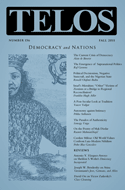Yaacov Yadgar’s “A Post-Secular Look at Tradition: Toward a Definition of ‘Traditionism'” appears in Telos 156 (Fall 2011). Read the full version online at the TELOS Online website, or purchase a print copy of the issue here.
 Building on the “post-secular” turn in the interdisciplinary study of society, culture, history, and religion, this essay aims at refocusing the investigative gaze at tradition and the attitudes toward it. Originating from an interest in Israeli-Jews who decline to self-identify as either “secular” or “religious” and instead choose “masorti” (deriving from masoret, Hebrew for tradition) as the label of their religious identity, the essay attempts to present an interpretative, phenomenological discussion of tradition, traditionalism, and what is suggested here as the proper translation of masorti-ness, “traditionism.” The essay first reconstructs an understanding of tradition that stresses its constitutive, dialogical, dynamic, and contemporary nature. Building on this understanding of tradition the paper then investigates what academic literature often refers to as “traditionalism,” commonly understood to be marking a rigid, ultra-conservative, and totalizing view of tradition’s authority over the individual’s as well as the community’s life. Contrasting “traditionism” with this traditionalist ultra-conservatism, the essay suggests an outline for interpreting and understanding traditionism as a (late-) modern, self-reflective, practical, critical, and selective adherence to tradition. The essay argues that traditionism thus offers a viable post-secular alternative to the predominant notion of an inherent antinomy between modernity and tradition.
Building on the “post-secular” turn in the interdisciplinary study of society, culture, history, and religion, this essay aims at refocusing the investigative gaze at tradition and the attitudes toward it. Originating from an interest in Israeli-Jews who decline to self-identify as either “secular” or “religious” and instead choose “masorti” (deriving from masoret, Hebrew for tradition) as the label of their religious identity, the essay attempts to present an interpretative, phenomenological discussion of tradition, traditionalism, and what is suggested here as the proper translation of masorti-ness, “traditionism.” The essay first reconstructs an understanding of tradition that stresses its constitutive, dialogical, dynamic, and contemporary nature. Building on this understanding of tradition the paper then investigates what academic literature often refers to as “traditionalism,” commonly understood to be marking a rigid, ultra-conservative, and totalizing view of tradition’s authority over the individual’s as well as the community’s life. Contrasting “traditionism” with this traditionalist ultra-conservatism, the essay suggests an outline for interpreting and understanding traditionism as a (late-) modern, self-reflective, practical, critical, and selective adherence to tradition. The essay argues that traditionism thus offers a viable post-secular alternative to the predominant notion of an inherent antinomy between modernity and tradition.








